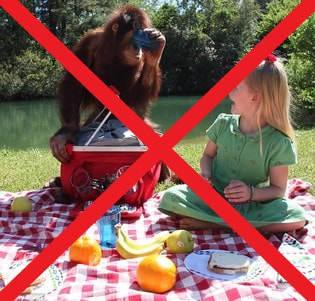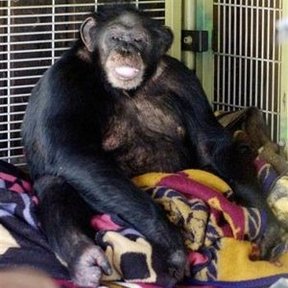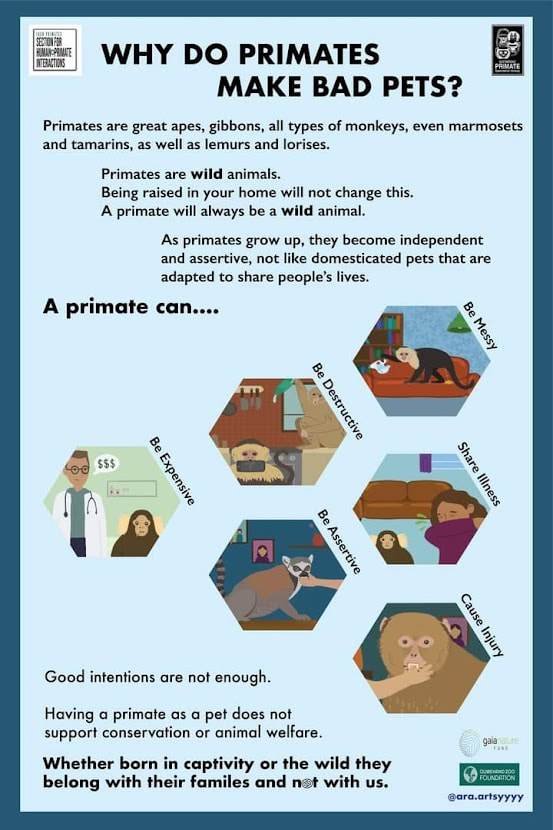Pet Trade

Orangutans should never be pets, for many of the same reasons that they should not be exploited in the entertainment industry.
Just as with apes bred for performance, those produced by breeders for the exotic pet industry remove them from their mothers as tiny infants, often within days of birth. The argument is that by doing so, the infant will “bond” with the human owner. Such pet owners typically dress the apes in human clothing, keep them in their homes, and treat them like human babies. But just as with performing apes, these baby-substitutes inevitably grow too large, strong, and willful to safely handle. At this point, the owners must cage their “pet” – a confusing and frustrating new reality for the young ape. Even if the pet-owner is able to construct an ape-proof caging system in his home or backyard, the situation will remain unsatisfying and inhumane for both parties – the orangutan, accustomed to a life as a treasured family pet, remains consigned to life in a cage (typically much smaller and less complex than the enclosures zoos and sanctuaries construct for apes), and the family faces the daily guilt and disappointment of managing their former cute and cuddly infant into adulthood. And since orangutans can live more than 50 years in captivity, there is the additional concern of caring for the ape beyond the lifetime of the original owners.
Just as with apes bred for performance, those produced by breeders for the exotic pet industry remove them from their mothers as tiny infants, often within days of birth. The argument is that by doing so, the infant will “bond” with the human owner. Such pet owners typically dress the apes in human clothing, keep them in their homes, and treat them like human babies. But just as with performing apes, these baby-substitutes inevitably grow too large, strong, and willful to safely handle. At this point, the owners must cage their “pet” – a confusing and frustrating new reality for the young ape. Even if the pet-owner is able to construct an ape-proof caging system in his home or backyard, the situation will remain unsatisfying and inhumane for both parties – the orangutan, accustomed to a life as a treasured family pet, remains consigned to life in a cage (typically much smaller and less complex than the enclosures zoos and sanctuaries construct for apes), and the family faces the daily guilt and disappointment of managing their former cute and cuddly infant into adulthood. And since orangutans can live more than 50 years in captivity, there is the additional concern of caring for the ape beyond the lifetime of the original owners.
 Travis chimpanzee
Travis chimpanzee
The international media reported extensively on the horrific February 2009 attack on Charla Nash by the pet chimpanzee Travis in Connecticut. Unfortunately, few reporters seemed to recognize the clear, direct link between performing apes and the tragedy of this and other attacks. All apes have the strength and unpredictability of Travis; a simple Internet search makes it clear that believing otherwise (“my pet primate would never hurt anyone – he loves me!”) is a dangerous delusion. Breeders who supply pet apes directly facilitate such tragedies by continuing to misrepresent apes as cute, cuddly, human companions.
They also detract from the inherent dignity of these magnificent animals. Apes are almost always demeaned in the pet trade. They are trained to do silly things to make us laugh. It diminishes our humanity to mock and ridicule endangered animals. Importantly, these activities have been proven to undermine conservation efforts; a 2008 article in Science showed that people are less likely to think that chimpanzees are endangered because they see them so often in movies and TV. The same is certainly true for orangutans, and with the ALL orangutan’s critically endangered status, this is an especially dangerous effect.
They also detract from the inherent dignity of these magnificent animals. Apes are almost always demeaned in the pet trade. They are trained to do silly things to make us laugh. It diminishes our humanity to mock and ridicule endangered animals. Importantly, these activities have been proven to undermine conservation efforts; a 2008 article in Science showed that people are less likely to think that chimpanzees are endangered because they see them so often in movies and TV. The same is certainly true for orangutans, and with the ALL orangutan’s critically endangered status, this is an especially dangerous effect.
Read the stories of orangutans Linus and Kiki, former pet orangutans who were lucky enough to find permanent sanctuary at the Center for Great Apes after they outgrew the pet environment. Such sanctuary is rarely available to former pet orangutans. Because they have been raised by humans and then often subjected to long-term isolation, ex-pets cannot be readily integrated into an orangutan group – they do not know how to “be orangutans.” Further, enclosures capable of safely and humanely housing apes require substantial space and careful adherence to strict construction standards – the empty shed on zoo grounds, a chain-link cage in the children’s zoo, or that monkey enclosure from which the current residents could be moved simply will not contain an ape. Together, these factors mean that ex-pet apes cannot just be moved to a zoo or sanctuary after they can no longer be free-roaming “members of the family.” Zoos and sanctuaries can't immediately place an ex-pet with an existing orangutan group, nor do they readily have the space or resources to build new enclosures for them.
No one can tell the story better than former owners of “pet” apes. Click here to read the story of chimpanzees Mikey and Louie in their former owner’s own words. There is no stronger argument against the keeping of apes as pets.
For More Information
- “Bedtime for Bonzo, the Real bedtime story", a publication by the four AZA Primate TAGs detailing the reasons why primates don’t make good pets.
- AZA's policy statement on the Personal Possession of Non-Human Primates.
- The International Primatological Society's statement opposing the keeping of primates as pets.
- AZA information on why Wild Animals Do Not Make Good Pets.


